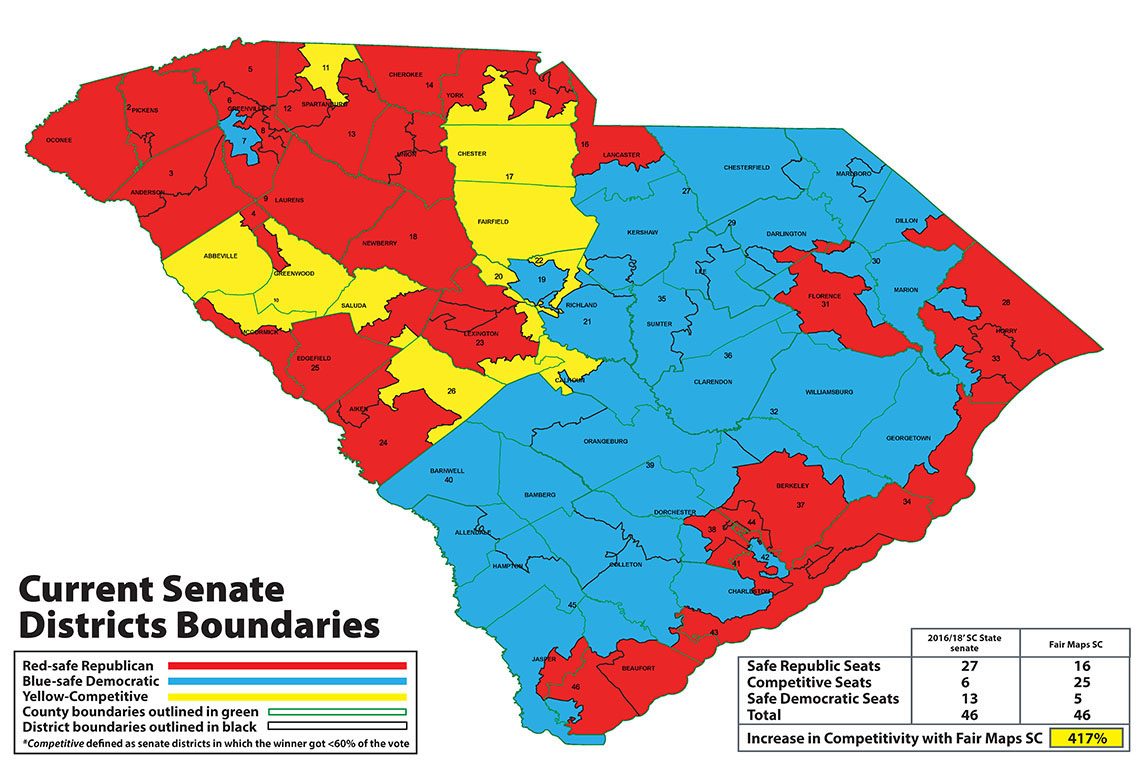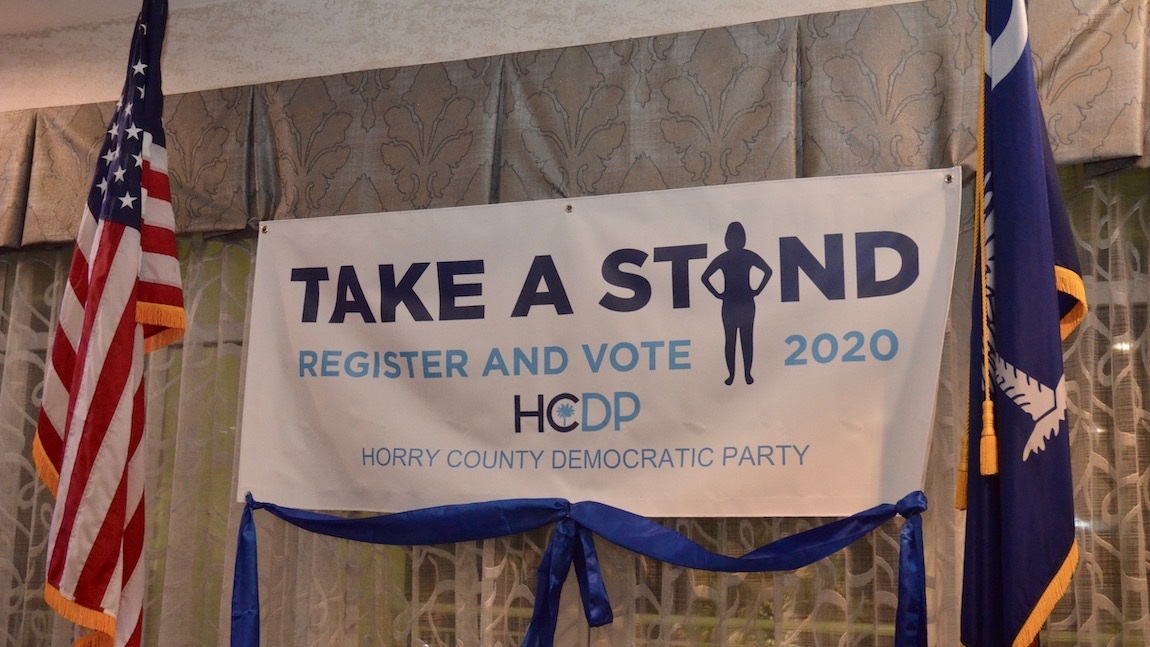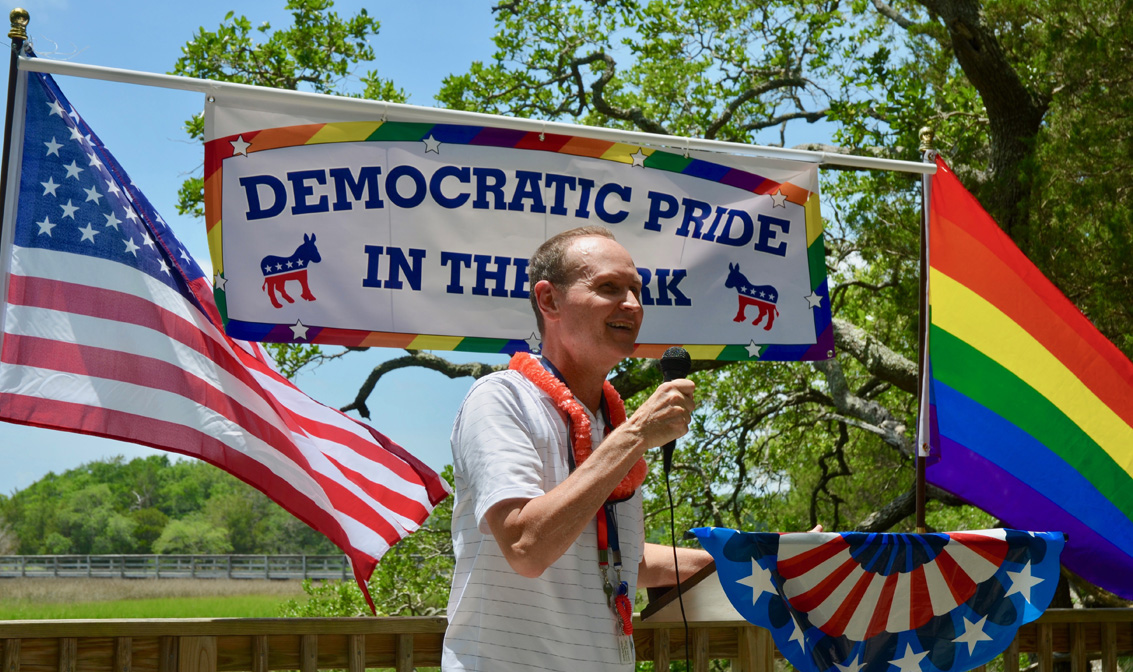By Mike Hodges
In South Carolina, as in many states across the nation, our elections are rigged by a process called “gerrymandering,” which gives incumbent politicians through the majority party the ability to practically assure their reelection.
That is wrong and reform efforts are underway. Here’s the story.
An Empty Ballot
As a transplant to South Carolina I looked forward to my first vote in the state. I enjoy researching local and state candidates, and ballot initiatives. I couldn’t quite seem to get a handle on the candidates though.
Once I received my ballot, I was even more confused. In all previous elections (in seven different states and in more than 10 communities) I have never seen such an empty ballot. Most candidates had no opposition. I was perplexed.
I went back to the counter and asked if the ballot was correct-they said it was. I then asked why there were so many uncontested offices-they could give me no answers. Now I know the reason. It is, in large part, due to gerrymandering of voting districts during redistricting.
Redistricting & Gerrymandering
The Oxford dictionary describes redistricting as “to divide or organize (an area) into new political or school districts.” As set forth in Article I, Section 2 of The Constitution of the United States, a census is taken every 10 years. This census is used to determine the number and apportionment of representatives and districts for each state to allow for changes in demographics.
In 45 states, including South Carolina, the required process of redistricting falls upon the state legislators. This process gives legislators sole discretion in creating and gerrymandering districts.
So, what is gerrymandering?
As defined by the Oxford dictionary, gerrymandering is to “manipulate the boundaries of (an electoral constituency) so as to favor one party or class.”
The word comes from a redrawing of Massachusetts state senate election districts (redistricting) in 1812. The Governor at the time, Governor Gerry, passed a bill that redistricted the state to favor his party. It so happened that one of the new districts resembled a salamander-hence the term gerrymandering was coined.
Voters Overruled
Our nation’s founders had great forethought when they created our Constitution, but they couldn’t see it all. They had no idea that through today’s technology the party in control could systematically, and with great precision, gerrymander voting districts to such an extent that it would be almost impossible to assure fair elections.
Fair Maps SC, in its manual “The Plan,” puts it this way: “Allowing legislators to draw their own districts is a conflict of interest that allows them to cherry-pick their voters. The current process leaves electoral maps vulnerable to partisan and racial bias, manipulated without public scrutiny.”
The legislators in power can now set up district lines to almost guarantee a certain party winner. The majority party tweaks district lines such that the districts look competitive without ever giving up the majority of the their seats, thus protecting the majority party, as well as incumbents of both parties.
This continues a self-fulfilling prophecy of long-term one-party rule combined with long-term incumbents of both parties, at the expense of voter’s choice.
No Competition (in South Carolina)
There are a total of 170 State House and Senate districts in South Carolina (124 House districts and 46 Senate districts, as well as seven U.S. House of Representatives districts.
According to Fair Maps SC, because of gerrymandered maps in the last few elections, almost 70% (117 out of 170) of the districts had only one candidate on the ballot. Of the remaining general election races that did have an opponent listed on the ballot, only 10% (17 out of 170) were considered competitive (won with less than 60% of the total votes).
That means nearly 90% (163 out of 170) percent of all the races in our state’s last few general elections had very little or no competition.
It gets worse. Because general elections have little competition, those 163 races are mostly decided in the primary elections. Unfortunately, only about 15% of registered voters vote in a primary election, and they are usually the most ardent party loyalists.
By allowing politicians to gerrymander our voting districts, we are essentially giving away our vote to the most polarized voters among us. It is no wonder our elected legislators are more-and-more extreme in their policy positions, since they are elected by a small minority of voters with the most extreme positions.
Fair Elections
Our nation’s elections have become more expensive (we will save this conversation for another time) and less in tune with the general public’s policy positions.
As we have seen recently, our elections are controlled almost exclusively by the legislators and party leaders with the most extreme views, and by those that can afford to fund them. We need to change this.
Republicans, Democrats, and Independents alike can and must work together to help produce a fair election process for all voters. Non-partisan organizations like Fair Maps SC are helping us do just that in South Carolina.
Fair Maps SC Proposal
Fair Maps SC is a South Carolina nonprofit 501(c)3 organization with the stated goal “to end gerrymandering in South Carolina without relying on the courts or the legislators.”
Their solution as listed on their website discusses creating an independent Citizens Redistricting Commission, and to pass a state constitutional amendment to vote for fair maps – in essence, to create competitive and fair elections by citizen involvement.
Fair Maps’ proposal to create this commission is like other states. In fact, Michigan’s proposal is now law. The process to select the members is lengthy and detailed but suffice to say it would be made up of 14 individuals randomly chosen from the state’s seven U.S. Congressional districts, with one from each district from the majority party and one from each district from the largest minority party.
The commission would use existing technologies to draw, and confirm, fair district maps. The process would include strict rules to verify impartiality and would be fully transparent to the public.
The redistricting plan would be designed to increase competition in elections. Having more candidates on the ballot that have a greater diversity in their policy positions allows us a more balanced array of candidates from which to choose as our elected officials.
Constitutional Amendment
Now the hard part.
Unlike other states, South Carolina does not allow a constitutional amendment on the state ballot by a voter’s petition. Voters must first petition each of their county councils to adopt a resolution requiring a citizens’ redistricting commission. With enough counties, and enough signatures, we can force the legislature to put a citizens’ redistricting commission to a state-wide vote.
Getting the required number of signatures (15% of registered voters) in each county will be difficult and time consuming, but the alternative is worse.
What is this alternative? It is the continued denial of the most basic principle of our democracy: One person, One vote. Without this, our democracy is not sustainable.
More Information
- Fair Maps SC (https://www.fairmapssc.com)
How You Can Help
- Stay informed. Do research on redistricting and gerrymandering
- Talk to your family, friends, and neighbors about a citizen’s redistricting committee
- Go to Fair Maps SC website and print out their “County Petition to End Gerrymandering” and Petition Guidelines.
- Volunteer to help collect signatures
- Call your representatives and tell them you are FOR a citizen-lead redistricting committee
- AND VOTE!
It is up to us, voters of all parties and all affiliations, to guarantee fair elections for everyone.





